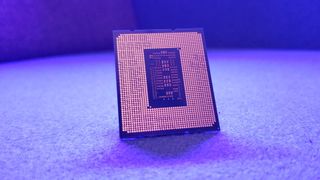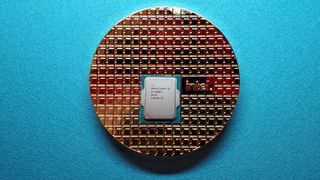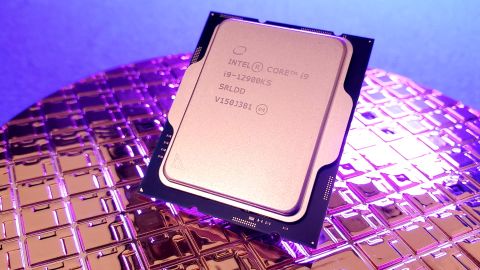Our Verdict
With Silicon Lottery shutting down, at least Intel is offering its own hyper expensive bin sorted chips. And that's about the most positive thing I can say about this just about fastest gaming CPU around.
For
- Fastest gaming CPU
Against
- Unnecessarily more expensive than the 12900K
- Just a bin-sorted chip
- Draws a huge amount of power as standard
PC Gamer's got your back
This isn't an easy processor to review. The Intel Core i9 12900KS is undoubtedly the fastest gaming CPU in the world, but seemingly only really exists so that Intel can lay claim to that moniker within its Alder Lake family. And, honestly, it's a processor only a marketer could love.
AMD recently launched its Ryzen 7 5800X3D, an impressively designed CPU using the latest chip stacking technology to boost its L3 cache stats and specifically bump its particular gaming chops. And I thought it was a decent chip because of that smart tech, the performance jump it offers over the standard Ryzen 7 5800X, and what it represents for the future.
But there is still the undeniable fact that your CPU, at the sort of resolution someone spending $400+ on a processor is going to be gaming at, will likely have little bearing on the actual gaming performance of your rig. Unless you've bizarrely weighted your build towards overspending on a CPU rather than your graphics card, it's the GPU that does all the heavy lifting in high-res PC gaming. And when you're looking at being GPU bound in a game, the difference between processors is only measurable in single digit frame rate deltas.
Still, at least for AMD's fastest gaming CPU it could lay claim to some new silicon design advantages and a consistent AM4 platform. Intel's Core i9 12900KS, on the other hand, cannot.
P cores: 8
E cores: 8
Thread count: 24
Base clock speed: 3.4GHz
Max Turbo: 5.5GHz
Cache: 30MB
Max power: 241W
Price: $739 (suggested, often ~$800)
The KS is identical to the 16-core, 24-thread Core i9 12900K we loved so well, but around $200 more expensive ostensibly because it's got another 300MHz tacked onto the boost clock. Yes, this is a bin-sorted version of the top Alder Lake chip, with a 5.5GHz max turbo speed out of the box. No overclocking required.
But, y'know, a big PSU and serious cooling definitely required.
What's also required is a willing suspension of disbelief in the vital nature of super high-end CPU silicon in a dedicated gaming rig. But, let's focus on the actual hardware at hand for a second.

The previously vilified notion of big.LITTLE CPU design on the desktop has actually turned out to offer serious gaming performance
We've covered the excellent Alder Lake processor design in our Core i9 12900K and Core i5 12600K reviews, but the basics are that Intel has delivered an incredible single thread microarchitecture in the Golden Cove design, and paired that with a host of smaller (though still surprisingly powerful) cores to deliver outstanding multi-threaded grunt. The previously vilified notion of big.LITTLE CPU design on the desktop has actually turned out to offer serious gaming performance.
Even down to the budget hero, the Core i5 12400, Alder Lake has delivered the goods. But the Core i9 12900KS just doesn't work for me. And I doubt it will work for anyone apart from the 'got to have it' folk who will pay above the odds for the absolute fastest silicon no matter whether it makes any tangible difference or not. Or for the Intel marketeers who need to be able to lay claim to the 'fastest gaming CPU' title.
1080p gaming performance






System performance






As I said before, it most definitely is the fastest gaming CPU, for what it's worth. We have to test at 1080p to ensure our RTX 3080-powered test rig is sufficiently CPU-bound to highlight any potential difference in performance. But at that level—a couple of outliers aside—it certainly offers a higher frame rate than either the Core i9 12900K or the Ryzen 7 5800X3D.
But rarely by enough to make the large difference in price between the three seem even remotely worth the payout. You could pay your $600 for the 12900K and not lose any sleep that at 1440p or 4K you're losing out not picking up the Core i9 12900KS. Hell, I'm pretty confident that you could say exactly the same if you dropped $250 on a Core i5 12600K. Maybe even $175 Core i5 12400.
Some of the goodwill Intel banked releasing its Alder Lake generation on the world has been lost, at least it has for me
One of the biggest issues, however, is the amount of power required to deliver those speeds. Even if we're just talking about gaming alone, where the CPU isn't going to be running under 100% load, the 12900KS demands 47% more power than the Ryzen 7 5800X3D. You are getting 23% higher average frames per second, but only at 1080p.
Under full load you're talking about this chip, out of the box with standard power restrictions in place, drawing all the way up to its 241W limits.

I'm going to say that some of the goodwill Intel banked releasing its Alder Lake generation on the world has been lost, at least it has for me. This bin-sorted, annoyingly expensive chip is purely about being able to say it's the fastest, and is more about a war of words with AMD than anything benefitting PC gamers.
Yes, it's the fastest gaming CPU, but that's like being able to say the wheels on your F1 car are capable of spinning faster than any other. Maybe true, but ultimately irrelevant when it comes to actually pushing that chunk of metal and carbon fibre around a track. Beyond a certain point, the engine—or here in gaming PCs, the graphics card—is the part that makes the real difference, anything else is just semantics.
With Silicon Lottery shutting down, at least Intel is offering its own hyper expensive bin sorted chips. And that's about the most positive thing I can say about this just about fastest gaming CPU around.

Dave has been gaming since the days of Zaxxon and Lady Bug on the Colecovision, and code books for the Commodore Vic 20 (Death Race 2000!). He built his first gaming PC at the tender age of 16, and finally finished bug-fixing the Cyrix-based system around a year later. When he dropped it out of the window. He first started writing for Official PlayStation Magazine and Xbox World many decades ago, then moved onto PC Format full-time, then PC Gamer, TechRadar, and T3 among others. Now he's back, writing about the nightmarish graphics card market, CPUs with more cores than sense, gaming laptops hotter than the sun, and SSDs more capacious than a Cybertruck.

Skyrim Special Edition's Community Shaders mod just hit 1.0 and became an essential graphical upgrade

Five new Steam games you probably missed (December 9, 2024)

Witcher 3 modders datamine a quest where Geralt would have teleported to Night City from Cyberpunk 2077: 'Technologically advanced, but broken. Dying.'
